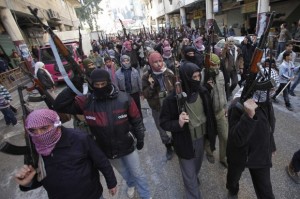Apparently the United States is going to go to war, at least sort of, with Syria.
That’s not because Syria has attacked the United States, because it hasn’t.
It’s not because the United States believes that it has strategic interests at stake in Syria’s civil war that warrant military intervention. If that were the case, we would have already taken action.
And it’s not really out of humanitarian concern with what’s going on in Syria’s civil war, although that will be the rhetorical cloak with which we don our military action. If we were truly acting out of humanitarian concern, we would have intervened tens of thousands of civilian deaths ago.
Instead, we are going to war with Syria because the President of the United States said that the use of chemical weapons was a “red line” that would change his “calculus” regarding involvement and Syrian strongman Bashar Assad has apparently made such egregious use of them that it can no longer be ignored.
In other words, we are going to war with Syria to save face.
Supposedly, the United States now has to take action because if we don’t, our subsequent threats won’t be taken seriously by other powers.
It’s already too late for that. The reluctance of the Obama administration to take action even after the president’s red line was crossed is transparent and obvious to all. Unless the military action is large enough to result in Assad’s ouster, which doesn’t appear to be in the offing, the rest of the world will continue to significantly discount the Obama administration’s bluster.
The Middle East is on fire. The Syrian civil war is lapping over into Lebanon and Jordan. Egypt is wretched politically and economically.
The places where the United States has previously intervened militarily are hardly oases of stability. Afghanistan appears likely to revert to rule by local warlords. Renewed sectarian violence is breaking out in Iraq. Libya is a place where a U.S. ambassador was killed by jihadists and has become an arms depot for jihadists throughout the region.
The argument is made that the Arab Spring went bad and the Middle East is on fire because the Obama administration retreated from involvement in the multitude of conflicts going on there. Think through the implications of that claim.
According to this line of thinking, the United States should have sufficient troops stationed in Afghanistan, Iraq and Libya to ensure relative peace and security in each country.
We should have picked which Syrian rebels to back and given them the firepower to knock off Assad. Although whether we should have supported the factions backed by Saudi Arabia or those supported by Turkey and Qatar, which are different, isn’t clear.
And the United States should have somehow bullied the Muslim Brotherhood to govern more inclusively in Egypt or the military not to engage in a coup.
A more grounded understanding of U.S. interests in the Middle East begins with accepting that we have no true allies in the region except for Israel.
Is the House of Saud our ally? Saudi Arabia promotes a radical strand of Islam, Wahhabism, throughout the world. Wahhabism often spawns jihadist movements. Jihadi terrorism gets important financial support from Saudi sources.
Saudi Arabia is one of the most despotic regimes in the world, including religious intolerance and persecution.
The principal difference between the House of Saud and the Muslim Brotherhood isn’t really religious and certainty isn’t relative commitment to democratic capitalism. It’s that the Brotherhood doesn’t believe in hereditary monarchies. And that’s a fight the United States should get in the middle of?
We have no true allies. There is not even a semi-clear path to peace and stability in the region. And even if there were, there’s not much the United States could do to steer regional powers toward it.
It’s hard to see how a war to save face is a meaningful step in any right direction.
. . . . . . . . . . . . . . . . . . . . . . . .
